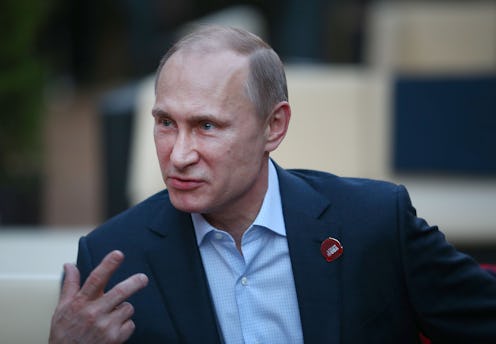News
Putin Says Russia Has An “Invincible” Missile That Could Reach Anywhere In The World

Russian President Vladimir Putin ended his annual address to parliament on Thursday with a dark announcement. He revealed two new Russian nuclear weapons the country has tested, including an "invincible" missile that is allegedly capable of reaching anywhere in the world. The second was an underwater vehicle that can deploy nukes, but it was the missile that made headlines in the United States after his speech, causing some to wonder whether Putin's missile is actually as dangerous for Americans as he wants them to think.
According to Putin's lengthy description of the missile:
[It is] a low-flying, difficult-to-spot cruise missile with a nuclear payload with a practically unlimited range and an unpredictable flight path, which can bypass lines of interception and is invincible in the face of all existing and future systems of both missile defense and air defense.
According to The Washington Post, the development of this weapon — if Putin is telling the truth about it — would constitute a big breakthrough for Russian military technology. Russian military analyst Alexander Golts said that he and other weapons experts "were all in shock" after Putin's speech.
The United States' missile defense system is highly advanced, but far from perfect; its tests over the years have yielded "mixed results," according to Reuters. If Russia's new missile can truly fly with a highly unpredictable path, it would be even harder for the U.S. defense systems to target it. And if Putin is being honest about the missile's range, it would be capable of flying further than the missiles of both the United States and North Korea.
With all of that said, Putin's announcement shouldn't be cause for panic. For one thing, it's not completely out of the blue. Despite the outsized media coverage of Kim Jong Un's nuclear posturing over the last year, the U.S. military considers its biggest nuclear threat to come from Russia, not North Korea.
As foreign policy and national security website War on the Rocks described it, Russia has "the largest nuclear arsenal in the world" with "nuclear weapons remain[ing] the single most important deterrent asset Russia has." And more specifically, we already knew that Putin's been modernizing his country's nuclear-armed cruise missiles (the kind of weapon he announced on Thursday).
Much energy has been directed toward figuring out how to best respond to Russia's proliferation, including to the threats of those specific missiles. Recently the U.S. Air Force has been improving its own long-range nuclear-armed cruise missile to act as a deterrent.
Earlier this month, the Pentagon released a Nuclear Posture Review summarizing how it hopes to develop its nuclear arsenal under Trump. According to the report, the Pentagon plans to focus on improving the United States' arsenal of low-yield nuclear weapons ("low-yield" means less power and scale; however, a low-yield bomb is about on par with the weapons the U.S. dropped on Japan at the end of the Second World War). Defense officials worry that our current weapons are so destructive that Russia doesn't believe we'll ever use them; they say that we need less powerful options that would serve as better deterrents.
"There are strong indications that our current strategy posture and capabilities are perceived by the Russians as potentially inadequate to deter them," Greg Weaver, the deputy director of strategic capabilities for the Joint Chiefs of Staff, told reporters after the report was released.
But even that shouldn't be cause for freaking out. As War on the Rocks puts it, "Russia today is less, not more likely to use nuclear weapons than it was 10 or 15 years ago," despite its continued proliferation. And it's important to remember to take anything coming from Putin's mouth with a grain of salt, particularly as he's gearing up for an election in less than a month and wants to come off well in the public eye. If his statements were hyperbolic, it wouldn't be out of the ordinary. National Interest notes that "some US observers believe Russia often exaggerates its military capabilities."
We don't know whether the weapons Putin boasted about actually exist — though U.S. intelligence may know — or, if they do, whether he accurately described their capabilities. We do know that the Pentagon already believes that Russia's nuclear arsenal poses a significant threat to the United States and that it's developing new weapons to act as deterrents. But until we have reliable public information about this supposedly "invincible" missile of Putin's, it's not worth a frenzy of alarm.